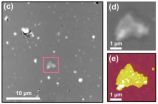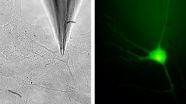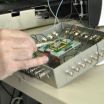(Press-News.org) Many aspects of the German Genetic Diagnostics Act (Gendiagnostikgesetz) are out of touch with the latest technology, almost impossible to implement in clinical practice, or even detrimental to the success of recognised screening tests, such as newborn screening. The Act, which came into force in February 2010, is in desperate need of amendment. This was the conclusion reached by the Academy Workgroup "Predictive genetic diagnostics as an instrument of disease prevention" of the German Academy of Sciences Leopoldina, the Berlin-Brandenburg Academy of Sciences and Humanities (for the Union of the German Academies of Sciences and Humanities), and the acatech - German Academy of Science and Engineering. The paper discusses all aspects of genetic testing of healthy individuals to prevent disease, including the medical, ethical, economic and legal dimensions of the issue.
"We are entering the age of genetic medicine," said the Workgroup's spokesperson, Professor Peter Propping, before going on to explain that an objective, factual discussion of the subject was important for the public and for government. Predictive genetic diagnostics involves analysing human genes to identify future disease risks. This type of test is becoming increasingly relevant because science is identifying more and more genetic variations that are linked to predispositions for specific diseases. These include a number of forms of hereditary cancers.
Scientists in the Workgroup agreed that predictive genetic testing should only be conducted at the request and in the interests of an individual. "Respect for the patients' freedom to make their own choices is essential," said Propping. The team categorically rejected eugenic ideas that aim to eliminate specific genes from the genome of an entire population or even go so far as to envision systematically "improving" the human gene pool.
The report also addressed the weaknesses and gaps in Germany's Genetic Diagnostics Act. Propping summed up the findings of the Workgroup by saying, "The Act should protect individuals. But to do so, it must offer adequate responses to questions of clinical practice." He explained that the Act must be amended to deal with the following situations:
Example 1: Newborn screening
The Act defines newborn screening, which has proven successful for decades, as universal genetic screening. This means that parents must be advised on the test prior to the blood sample being taken from their child's heel. However, nurses and midwives are not authorised to give this advice – only doctors are. There is increasing evidence that in the case of home births blood samples are frequently not taken and screenings not conducted, even though this is not actually in line with the parents' wishes. As a result it is not always possible to offer sick children proper treatment, even when it is urgently required. Therefore the Act must be amended to allow nurses and midwives to advise parents on the test.
Example 2: The family dimension
The Act places higher value on patient-doctor confidentiality than it does on a doctor's duty to provide care. For example, if tests show that an individual has a treatable, autosomal dominant hereditary disease for which a causative mutation has been identified, he or she is instructed to inform relatives that they may also risk developing the disease. After all, early diagnosis makes it easier to treat many illnesses, such as hereditary forms of breast cancer and intestinal cancer. However, doctors have no powers to check whether this information is passed on within the family or whether it is, perhaps even purposefully, withheld. With this in mind, the Act should not, as a rule, accord lower priority to a doctor's duty to provide care. Doctors should be in a position to assess individual cases and decide whether to inform family members in an appropriate manner of the risks of disease when there is a definite medical benefit in doing so.
Example 3: Data storage
The Act stipulates that as a general rule, doctors must store the results of genetic tests for ten years, after which time the information must be destroyed. This rule applies unless patients request that their information be destroyed sooner or stored for longer, and data must be retained if its destruction would infringe on patient interests worthy of protection. In everyday clinical practice, these regulations are impracticable and inappropriate. It is not always possible to establish within a decade what impact the – in contrast to other tests – irreversible genetic findings may have at a later date. Furthermore, the realities of clinical practice make it impossible for doctors to reassess each case before the ten-year limit expires and to reach a decision on whether to keep the data or destroy it. Thus, the Act should remove limitations on how long results can be stored.
INFORMATION:
The Workgroup comprised 17 renowned scientists from a variety of disciplines, including human genetics, medical ethics, law and health economics. Led by member of the Leopoldina Presidium Professor Peter Propping (human genetics, Bonn), the team worked intensively for 18 months on the report, which is now complete. The editorial group comprised Professor Propping, Professor Claus Bartram (human genetics, Heidelberg), Professor Jörg Schmidtke (human genetics, Hanover), Professor Jochen Taupitz (medical law, Mannheim) and Professor Urban Wiesing, (medical ethics, Tübingen).
A short English version of the paper can be found here: www.leopoldina.org
END
Using a neutron beam as a probe, researchers working at the National Institute of Standards and Technology (NIST) have begun to reveal the crystal structure of a compound essential to technologies ranging from sonar to computer memory. Their recent work* provides long-sought insight into just how a widely used material of modern technology actually works.
The compound is a "piezoelectric," a material capable of changing one kind of energy into another—mechanical to electrical, or vice versa. Long employed in sonar systems to detect sound waves, more recently piezoelectrics ...
VIDEO:
Wireless. For most, the word conjures images quaint coffee shops or busy airport lobbies -- places where people drop in to check on business or check in with other people.
But...
Click here for more information.
BEAUMONT – Wireless. For most, the word conjures images quaint coffee shops or busy airport lobbies – places where people drop in to check on business or check in with other people.
But increasingly "wireless" is showing up on the farm to help produce better ...
The researchers characterize their new technique as a neat solution to the "needle in a haystack" problem of nanoscale microscopy, but it's more like the difference between finding the coffee table in a darkened room either by walking around until you fall over it, or using a flashlight. In a new paper,* a group from JILA—a joint venture of the National Institute of Standards and Technology (NIST) and the University of Colorado—finds tiny assemblies of biomolecules for subsequent detailed imaging by combining precision laser optics with atomic force microscopy.
The ...
Neurons communicate via chemical transmitters which they store in the bubble-like synaptic vesicles and release as required. To be able to react reliably to stimulation, neurons must have a certain number of "acutely releasable" vesicles. With the help of a new method, neuroscientists at the Max Planck Institute of Experimental Medicine in Göttingen have now discovered that neurons systematically recycle the protein components necessary for transmitter release and in this way guarantee the reliability of signal transmission in the brain. If this process is disrupted, the ...
Montreal, November 10, 2010 – The initial findings of a survey on the prevalence of gambling in Quebec have been released. The study also deals with behavior problems associated with gambling. The study reveals that nearly 70 percent of Quebec adults report having bet or spent money on gambling during the previous 12 months. It also found Quebecers spend an average of $483 annually on gambling activities.
This survey was conducted between June and September 2009 throughout the province among 11,888 non-institutionalized adults over the age of 18. It constitutes the first ...
November 10, 2010 -- To keep soldiers in the battlefield healthy, the U.S. Army is exploring new ways to detect harmful bacteria in water.
Current techniques for analyzing water in the field can take as long as 24 hours to complete, according to Bart Lipkens of Western New England College in Springfield, Massachusetts and his colleagues at Physical Sciences in Andover, Ma.
They are working on an alternative technology that uses sound waves to accelerate the process.
"The goal of our project is to speed up the detection of bacteria in water supplies," said Lipkens. ...
The eye is not just a lens that takes pictures and converts them into electrical signals. As with all vertebrates, nerve cells in the human eye separate an image into different image channels once it has been projected onto the retina. This pre-sorted information is then transmitted to the brain as parallel image sequences. Scientists from the Max Planck Institute of Neurobiology in Martinsried have now discovered that fruit flies process optical information in a similar way. The evidence suggests that this type of wiring is an effective energy-saving mechanism and is therefore ...
Dogs have long been called man's best bomb detector –– until now.
A Tel Aviv University scientist leads a research team that has developed a powerful electronic sensor to detect multiple kinds of explosives –– including those used in the recent Yemeni bomb threat. Based on nanotechnology advances, the new sensor is small, portable, and is more sensitive and reliable at detecting explosives than any sniffer dog, says its lead researcher Prof. Fernando Patolsky of Tel Aviv University's Raymond and Beverly Sackler School of Chemistry.
With scientific findings on it published ...
CHAMPAIGN, Ill. — The Chrysler and General Motors bankruptcy reorganizations represented a sea change in corporate restructuring, one that could portend the end of our current system of bankruptcy reorganization, according to a published article by two University of Illinois experts in bankruptcy law.
Law professors Charles J. Tabb and Ralph Brubaker argue that the legal principles applied in the GM and Chrysler bankruptcies – two of the largest in U.S. history at $83.5 and $39.9 billion, respectively – were misguided, and ultimately have undermined the distributional ...
Manufacturer recalls of toys, promotional drinking glasses, and other children's products constitute an ongoing "toxic toys crisis" that requires banning potentially harmful ingredients in these products and other changes in policy and practices. That's the conclusion of a new analysis in ACS' Environmental Science & Technology, a semi-monthly journal.
Monica Becker, Sally Edwards and Rachel Massey note that in June the United States government recalled 12 million promotional drinking glasses sold at a fast-food restaurant chain because the painted coating contained ...





